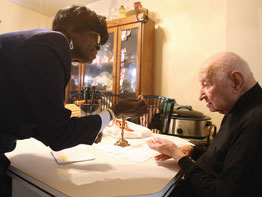For years, Horace Wisniewski faithfully brought Holy Communion to the sick and dying throughout Dundalk. But after a heart attack slowed him down about a year ago, the roles changed. Now the 90-year-old extraordinary minister of Holy Communion relies on others to bring the Eucharist to him.
On a recent spring morning, one of Mr. Wisniewski’s fellow parishioners, Mary Branch, arrived on his doorstep in Dundalk for her weekly visit. Carrying a consecrated host inside a gold pyx, Ms. Branch exchanged a few pleasantries before gently unfolding a white lace cloth and placing it on her friend’s dining-room table along with a golden crucifix.
After reciting some prayers and reading a Gospel passage from St. John, Ms. Branch solemnly opened the pyx and raised the host a few inches from Mr. Wisniewski’s eyes.
“This is the Lamb of God who takes away the sins of the world, happy are those who are called to his supper,” Ms. Branch proclaimed in a loud voice.
Mr. Wisniewski responded with the prayer he had recited so many times before: “Lord, I am not worthy to receive you, but only say the word and I shall be healed.”
Moments after receiving Communion and making the sign of the cross, Mr. Wisniewski said he relies on the sacrament to get him through the week.
“Holy Communion makes you feel better that you have received Jesus,” he explained. “I’m so glad I’m able to receive it. It gives me strength.”
Mr. Wisniewski believes many people receive spiritual healing from receiving the sacrament. He has a collection of thank-you letters from people who have written to him over the years telling him how much it meant that he brought them Holy Communion.
“It means a lot,” he said.
Ms. Branch is also strengthened by sharing the Eucharist with others, she said.
“It’s one of the most important things I’ve ever done in my life,” she said. “You establish friendships with a lot of people. Some of them don’t have anyone to visit. They really appreciate it.”
Dolly Morris, director of health care ministry at Sacred Heart of Mary in Graceland Park, said the sick, elderly and people in nursing homes are “in awe” of the time and effort parishioners take to be with them. It’s a way of helping those who can’t be in church stay connected to their parish, she said.
Sometimes the sick are embarrassed by their physical condition, Ms. Morris said. But that shouldn’t prevent them from seeking the sacrament.
“We don’t come to look at them,” she said. “We come to bring God to them.”


